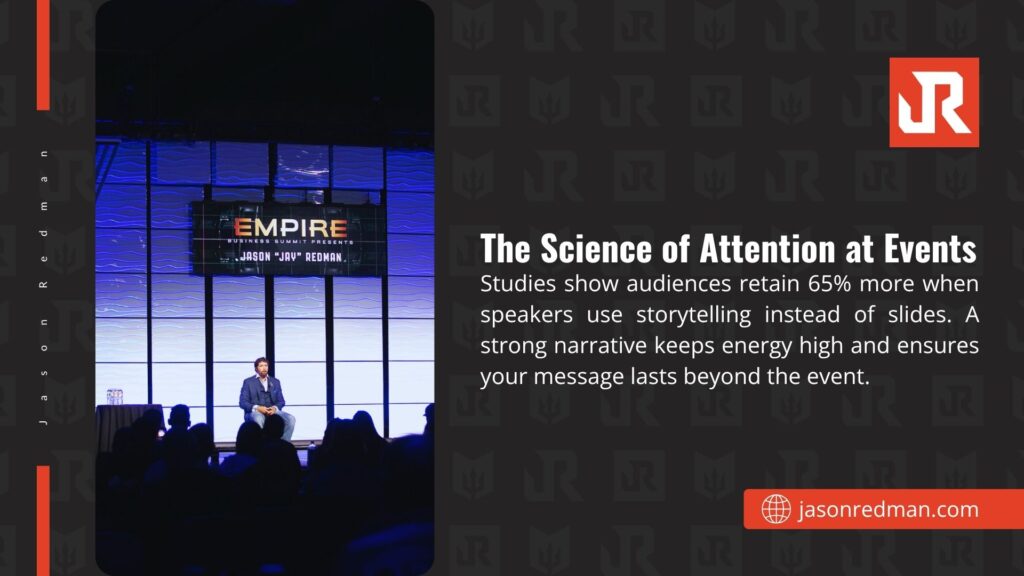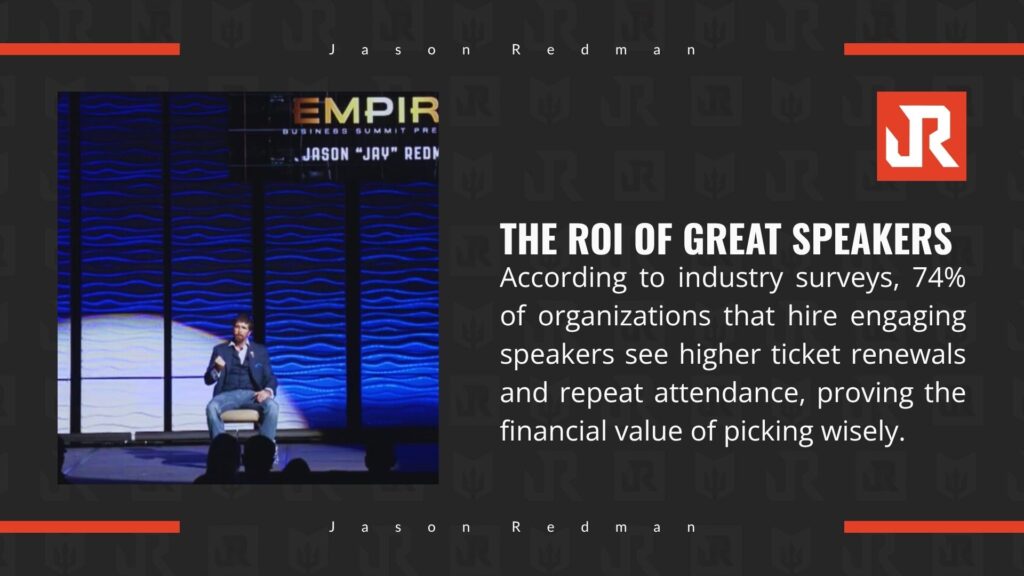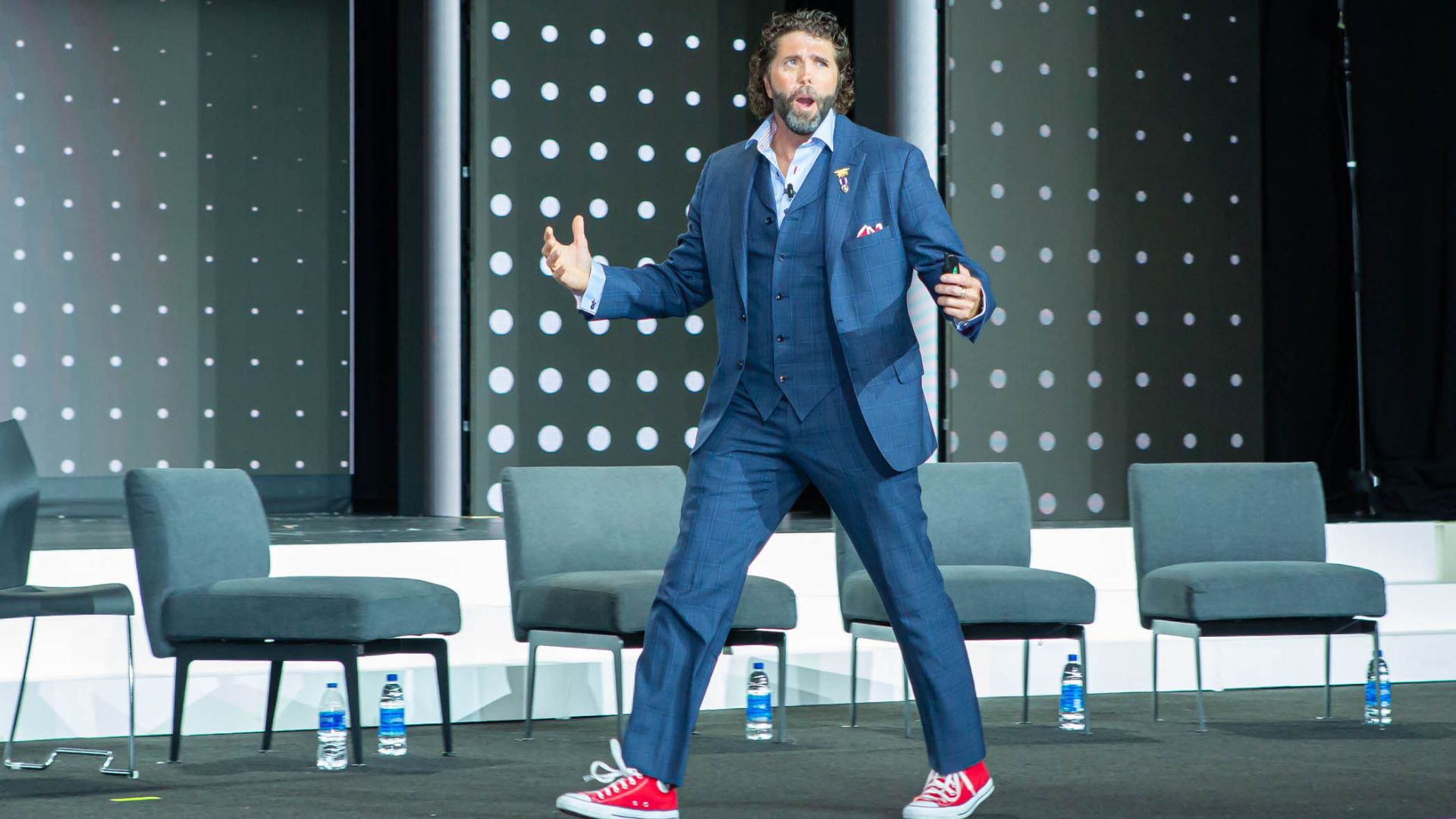Event planners have horror stories. The motivational speaker who put half the audience to sleep. The $25,000 “expert” who delivered the same tired presentation from 2018. The perfectly planned corporate retreat that turned into a disaster when the speaker showed up unprepared and clearly didn’t care.
These disasters happen because most advice about how to find a speaker for an event comes from people who’ve never actually organized a real event or dealt with speakers who don’t deliver what they promise. The speaker industry is packed with smooth talkers who look impressive on paper but bomb when it matters.
Smart event organizers learn this the hard way, then develop systems that actually work. Not the theoretical approaches found on speaker bureau websites, but practical strategies that prevent disasters and create memorable experiences attendees talk about months later.
The data backs this up. Organizations that nail their speaker selection report 68% higher attendee satisfaction and 45% better post-event engagement compared to those who just book whoever fits their budget. Getting there means avoiding the traps that catch most event planners.
Why Speaker Searches Go Wrong from Day One
Most event organizers approach speaker hunting like they’re ordering office supplies. They’ve got a budget, they need someone who talks about leadership or innovation, and they figure any professional speaker will handle the job adequately.
This backwards thinking creates problems. The speaker is often the main reason people attend the event. Mess up this decision and nothing else matters how impressive the venue looks or how good the food tastes.
Budget-driven decisions cause the biggest mistakes. Paying $8,000 for the right speaker beats spending $18,000 on the wrong one every time. Bad speakers waste everyone’s time and damage reputations with attendees who trusted the organization to deliver value.
Speaker bureaus make this worse by pushing whoever generates the fattest commissions. That celebrity they’re enthusiastically recommending for $30,000? The bureau pockets $7,500. The industry expert who’d be perfect but only charges $9,000? Lower commission means they barely mention this option.
Many of the most effective speakers avoid bureaus entirely. These professionals are too busy doing meaningful work in their fields to play speaker circuit politics. They speak because they have valuable insights to share, not because it’s their primary income source.
Event planners often need speakers who can tackle specific issues like helping attendees overcome fear of public speaking or providing practical confidence training rather than generic motivation that sounds inspiring but changes nothing.
Where Smart Planners Find Speakers Who Actually Deliver
Speaker directories and Google searches mostly surface the same recycled names. The really good speakers are hiding in plain sight, but finding them requires different strategies.
Successful event planners start by thinking about conferences where speakers made them reconsider their assumptions about something important. Not the presenters who got polite applause, but the ones who had audiences frantically taking notes and asking follow-up questions. These speakers often aren’t full-time professionals, which means they bring fresh perspectives instead of worn-out material.
Professional networks yield better recommendations than any search engine. Colleagues who organize events love sharing information about speakers who exceeded expectations. They’ll also warn about disasters, which saves time and prevents expensive mistakes.
Industry publications feature experts who haven’t hit the mainstream speaker circuit yet. These people build reputations through actual expertise rather than marketing budgets. They’re motivated to deliver exceptional content because their speaking opportunities depend on results, not just polished promotional materials.
LinkedIn works when used strategically. Instead of searching for “keynote speakers,” smart planners look for professionals posting thoughtful content about industry challenges. The consultant writing insightful articles about workplace culture probably has more valuable things to say than someone posting motivational quotes over stock photos.
University researchers and professors often make outstanding speakers if they can translate academic concepts into practical applications. They bring credibility and cutting-edge insights, plus they’re usually excited to speak to audiences who can actually implement their research.
The Truth About Speaker Pricing
Speaker fees seem random until someone explains how pricing actually works. The same person might quote $6,000 for one event and $22,000 for another based on factors that have nothing to do with content quality or presentation skills.
Demand controls everything. Speakers booked solid for six months can charge whatever they want. The exact same speaker with open calendar slots next month will negotiate significantly. This makes timing more important than most planners realize.
Most speakers maintain different fee structures they don’t advertise publicly. Corporate rates, nonprofit discounts, virtual event pricing, local engagement rates, and “this sounds like a great organization to work with” pricing all exist. Planners who are transparent about budgets and explain the mutual benefits often discover flexible options.
Travel expenses can double total costs. An $8,500 speaker becomes a $14,000 investment after flights, hotels, ground transportation, and meals. Virtual presentations changed this dynamic completely. Many speakers charge 50-70% of their in-person rates for virtual events, and some actually perform better on camera than on stage.
Most corporate events find the pricing sweet spot between $8,000 and $20,000. Below this range, planners often encounter part-time speakers who might not prepare thoroughly. Above it, fees usually reflect celebrity status that might not translate to actual value for specific audiences.
Here’s what different price ranges typically deliver:
- $3,000-$8,000: Local experts, consultants, emerging speakers building reputations. Can be outstanding if they specialize in relevant industries.
- $8,000-$20,000: Experienced professionals who treat speaking as serious business. The best combination of expertise and presentation skills usually falls here.
- $20,000-$45,000: Established thought leaders, published authors, former executives. Higher fees are justified by proven track records and name recognition.
- $45,000+: Celebrity speakers who attract audiences based on fame rather than content. Only worthwhile if attendance numbers justify the premium.

How to Identify Speakers Who Won’t Disappoint
Speaker reels showcase highlight moments, not typical performance. Testimonials get cherry-picked or sometimes fabricated entirely. Experienced planners evaluate speakers based on what actually predicts success.
Professional speakers ask detailed questions about audiences, objectives, and expectations before discussing money or logistics. They want to understand attendee demographics, challenges those people face, and how their presentation connects to broader event goals.
Amateur speakers focus immediately on payment terms and technical requirements.
Customization separates real professionals from generic presenters. The best speakers develop content specifically for each event.
Recent work matters more than career achievements. Anyone can compile their greatest moments for promotional videos. Smart planners ask about last month’s presentations, how speakers handle unexpected situations, and whether they engage with attendees before and after their sessions.
References provide valuable insights, but only from comparable audiences. A speaker who dominated at a technology conference might flop at a healthcare event, even discussing identical topics. Industry cultures, terminology, and expectations vary dramatically.
The most effective speakers provide value beyond their presentations. They share resources, offer follow-up consultation, and connect with attendees interested in continuing conversations. They’re building relationships and creating lasting impact, not just delivering content.
Booking Processes That Prevent Common Problems
Most speaker booking systems create unnecessary complications. Experienced planners streamline the process to avoid typical pitfalls.
Conversations should start 6-8 months early for major events, but contracts wait until after substantive discussions about content and expectations. Professional speakers appreciate preparation time. Amateurs pressure planners to sign agreements immediately.
Budget discussions happen upfront to avoid wasted time. Rather than asking “what’s your cheapest option”, experienced planners say something like “our budget for this presentation is approximately $X, and we’re seeking someone who can deliver Y outcomes for our audience”.
Contracts must address real-world complications, not just basic logistics. Weather delays, equipment failures, audience size changes, content modifications, and speaker emergencies all occur regularly. Standard contracts typically protect speakers while leaving planners exposed. Balanced agreements cover both parties fairly.
Preparation timelines need built-in buffer periods. Professional speakers require information about organizations, audiences, and objectives. They’ll want to review company materials, understand industry challenges, and possibly interview key attendees. This groundwork separates adequate presentations from exceptional ones.
Content ownership, recording permissions, and post-event materials should be clarified upfront. Some speakers freely share slides and resources; others consider these proprietary assets. Knowing what to expect prevents misunderstandings later.
Planners might consider speakers who can extend impact through additional services like how to find a life coach guidance or follow-up development programs that reinforce key messages beyond the initial presentation.

Maximizing Long-Term Value from Speaker Investments
Smart planners treat speaker relationships as ongoing partnerships rather than single transactions. This approach delivers better results and often reduces future costs.
Feedback collection should happen immediately while presentations remain fresh in attendees’ minds. Instead of asking “how was the speaker,” effective planners ask “what will attendees do differently based on what they learned today?” These answers reveal whether speakers created real change or just provided entertainment.
Documentation helps with future planning. Speaker preparation processes, audience reactions, logistical challenges, and overall effectiveness should all be recorded. This information becomes invaluable for similar events and speaker recommendations to colleagues.
Professional speakers provide follow-up resources without being asked. Slides, reading recommendations, contact information for continued discussions, and additional materials that reinforce key messages. Speakers who disappear after their presentations aren’t focused on long-term impact.
Relationship building with effective speakers pays dividends. They recommend other quality professionals, provide event planning insights, and often return for future engagements at preferential rates because they know certain organizations are professional and collaborative.
Long-term outcome tracking, when feasible, helps justify speaker investments and guide future selections. Did sales teams implement the strategies they learned? Are managers actually using leadership techniques?
This data supports budget requests and improves decision-making.
The most successful events feature speakers who function as both motivational speakers and inspirational speakers while providing practical frameworks attendees can implement immediately rather than just temporary emotional boosts.
Stop Settling for Speakers Who Don’t Create Real Change
Most events fail because organizers choose predictable speakers who deliver forgettable content that doesn’t move anyone to action. Attendees deserve more than recycled motivational speeches and generic business advice that sounds good but changes nothing.
The difference between successful events and wasted opportunities comes down to working with speakers who understand specific organizational challenges and provide practical solutions teams will actually implement. Not inspiration that fades by the next coffee break, but strategies that create measurable improvements.
Ready to book a speaker who will actually impact results?
Visit jasonredman.com to explore how customized presentations address real challenges and deliver practical strategies teams can use immediately.
The next event could be the catalyst that transforms how the organization approaches its biggest challenges. Make it happen instead of just filling another agenda slot.


